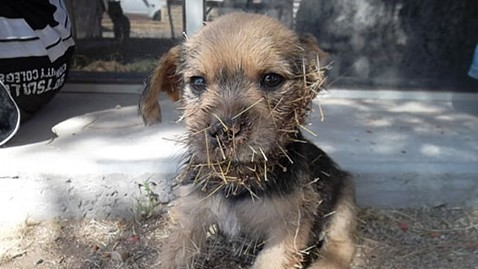April is Pet First Aid Awareness month, so we couldn’t resist highlighting what is possibly the cutest injured dog ever: Cactus Jack. Little Jack got tangled up in a cactus in Arizona but is doing great now and was just adopted. Thankfully the local Humane Society emergency rescue personnel knew just how to help him.
Want to be sure you’re prepared to take care of your furry loved one? Follow the below tips.
PET FIRST AID
Courses are available at many Red Cross chapters on how to care for your pet. The Red Cross has also developed Dog First Aid and Cat First Aid Guides with DVDs that teach basic responsibilities like spaying/neutering and giving medications, to performing CPR and preparing for disasters. Visit Redcross.org/training or call 1-800 RED CROSS to see when classes are available. The Guides are available through the Red Cross Store.
HOW TO KEEP YOUR PET HEALTHY
Pet owners can follow these important steps to help keep their pet healthy:
- Give pets plenty of exercise.
- Make sure they have plenty of fresh, cool water.
- Make sure they get regular yearly checkups with their veterinarian, and are up to date on vaccines, especially rabies.
- Get pets spayed or neutered.
- Keep dogs on leashes outside – another animal may be too much temptation
- Know how to perform CPR and provide basic first aid until veterinary care is available
EMERGENCIES AND YOUR PET
Don’t forget to include pets in planning for emergencies in your home or neighborhood:
- Make plans to take your pets with you if you have to evacuate.
- Most Red Cross shelters cannot accept pets because of health and safety concerns and other considerations. Know which friends, relatives, hotels, boarding facilities will accept pets in an emergency.
- Assemble an easy-to-carry kit with emergency supplies for pets:
- Leashes, harnesses and/or carriers
- Food, drinking water, bowls, manual can opener
- Medications and copies of medical records
- Current photos of the pets
Pet First Aid Awareness Month is a great time for people to learn how to protect their pet and keep them healthy. More information on how to keep pets in good health are located on the Red Cross Pets and Disaster Safety Checklist.

